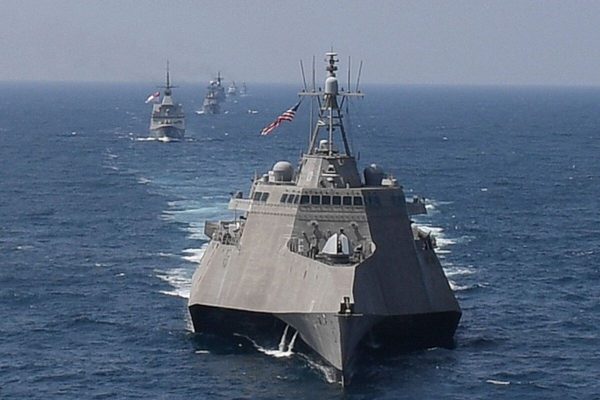Don’t let national security state spin keep you up at night.
Why America Is Set to Lose the Next War

Our elite forces are not so elite.
News that the wargames which the RAND corporation runs for the U.S. government show U.S. forces getting “its ass handed to it” by Russia and China have elicited disbelief: “how could this possibly be?” The short answer is that the U.S. armed forces are utterly corrupt: the very definition of parade ground forces, superbly equipped, fabulously paid (to look good)—but utterly incapable of winning the wars that our even more corrupt national security establishment defines for them. Corrupt, and un-serious.
Specifically: U.S. forces fail in the wargames, and would fare worse in real life, because they would be sent to fight the Chinese for control of the Western Pacific, and Russia for control of areas west of the Niemen river, as well as north of Crimea. The Chinese and Russians, respectively, would enjoy advantages in these areas. U.S. forces, configured as they are because of inter- and intra-Service corporate priorities, because of military-industrial collusion, and above all because of the national security establishment’s self-regarding prejudices and proclivities, are not based, sized, or equipped seriously to contest those advantages. Above all, they lack realistic plans for doing so. In sum, U.S. forces would lose these wars because of classic mismatches between ends and means. All entirely foreseeable. I repeat: Corruption.
The wargames dealt only with operational/tactical factors on the conventional level in the theaters of operation. But China and Russia are nuclear powers whose missiles can deliver nuclear warheads to the U.S. Neither has been shy about pointing out that they might force the U.S. to choose between its objective in their back yard and the loss of one or more American cities. Moreover, longstanding U.S. policy, most recently reaffirmed in 2019, is not to have any equipment that can defend against Russian or Chinese missiles. If, perchance, Chinese or Russian forces should have difficulty disposing of U.S. challenges, raising the nuclear specter would surely force the U.S. side to reconsider why we engaged in war in others’ back yards without the capacity to protect ourselves at home. Since nuclear weapons are fully integrated into Russia’s ground forces, this rude awakening would likely come in the course of ordinary operations. On the Chinese side, we might well see the annihilation of Guam. But, one might respond, “U.S. nuclear missile forces are so superior to China’s!” Sure. Superior for what? What good would killing a couple of million Chinese do?
What forces against what, where, to do what, is the nub of the military matter. The Chinese and Russians, respectively, have good strategic, operational, and tactical answers. The U.S. side does not.
The Chinese want to control the Western Pacific militarily largely from the land. They began by building hundreds, perhaps thousands, of medium-range missiles able to cover the sea out to the eastern edge of Taiwan, making them largely invulnerable by emplacing them in caves or on mobile platforms. To this they added excellent aircraft with cruise missiles, and diesel-electric submarines that would be placed—still and quiet—to wait for the U.S. carriers. Then, they developed the DF-21, a ballistic missile that can adjust course on re-entry and kill a carrier with a nuclear warhead. And then, they pushed that defensive envelope outward by building a network of artificial islands in the South China Sea, the military value of each exceeding that of several carriers.
China’s control exists. To try undoing it with current bases and equipment, the U.S. would have to send at least four irreplaceable carrier battle groups across the Pacific to battle their way through Chinese defenses. The full health of America’s satellite network is a prerequisite for such an attempt. But the Chinese are certain to attack that network. Since the U.S. has precisely zero means of protecting against kinetic ASATs, we must assume something less than precise functioning of numerically vastly inferior forces whose perfect functioning is essential to their operation in an enemy environment. Guam, and Yokosuka, over a thousand miles away from the action, would be the only nearby bases. The U.S. has studiously avoided fortifying Taiwan. But even assuming perfect functioning, the U.S. offensive in the Western Pacific would consist of a contest of attrition, in which China has the overwhelming advantage. There is no substitute for strategic vision. China has it, the U.S. does not.
On the Russian side, the strategic objective is equally clear: maintain superiority in an area well known to, and easily reached by, the home team against what the Americans can bring from far away. The area east of Poland, between Lithuania and northern Ukraine, was the scene of the great Soviet summer 1944 offensive that crushed the Wehrmacht. One or perhaps two combat brigades would be the maximum that the U.S. could deploy to that area, probably by air through Warsaw. Russian operations would consist of encirclement by land and denial of resupply by air through its formidable S-400 air defense system. Russian operations envisage a minimum of combat and maximal exploitation of the theater’s distance from U.S. power. The operational objective would be to turn U.S. troops into hostages. The same would apply to the southern theater—except that U.S. operations there would be aided by a U.S. carrier battle group in the Black Sea—another reservoir of hostages.
For a half century, the U.S. military-industrial-national-security establishment has been getting America’s collective ass kicked around the world. As patriotic Americans have bled, their superiors have gone to Valhallas in their retirement villas and as experts on Fox News. It’s past time for Americans to realize how overpraised and overpaid this bunch really are.
The American Mind presents a range of perspectives. Views are writers’ own and do not necessarily represent those of The Claremont Institute.
The American Mind is a publication of the Claremont Institute, a non-profit 501(c)(3) organization, dedicated to restoring the principles of the American Founding to their rightful, preeminent authority in our national life. Interested in supporting our work? Gifts to the Claremont Institute are tax-deductible.
National security starts at home.
After a bad round of war games, America wonders which wars to fight and how to win them.



